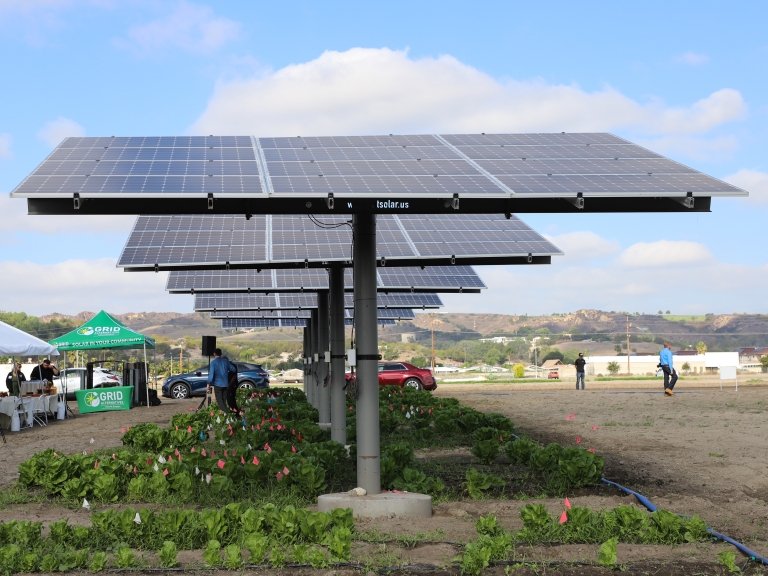There are three tracks within the Environmental Analysis major:
- Environment and Society (11 courses and internship)
- Environmental Policy (11 courses and internship)
- Sustainability and the Built Environment (12 courses and internship)
- Self-designed (11 courses and internship)
All EA major Tracks consist of three sets of requirements:
- A Core set of Courses (EA 010 PZ -Intro to Environmental Analysis, EA 030L KS -Science and the Environment, EA 086 PZ -Environmental Justice, and an additional natural science course) and EA 150 PZ -Senior Sem in Environ Analysis
- A Track with Course Plan
- An Environmental Internship for the Environment and Society, Environmental Policy, and Sustainability and the Built Environment Tracks
A minimum of 11 courses is required for the Environment and Society and Environmental Policy tracks, and 12 courses for the Sustainability and Built Environment track. Students in the Environment and Society, Environmental Policy, and Sustainability and the Built Environment tracks will find that their major has considerable structure but also allows for flexibility in the selection of courses within the track. It is essential that majors and prospective majors proactively work with their advisers to select courses, both within the major and outside the major, that will help meet the student’s educational, personal and professional goals.
A senior thesis is not required for the Environment and Society, Environmental Policy, and Sustainability and the Built Environment tracks. For those who choose to undertake a senior project, sometimes referred to as a “capstone” project, a senior project is a substantial work, such as an exhibition, website, blog, film/video, performance, curriculum, design project, or other hands-on or creative endeavor is required. The process and outcome of the project should be digitally documented in an appropriate format (audio, video, pdf, web url, and so forth). Normally students will write a 20-30 page paper that describes the work and that anchors it in scholarly literature in order to build a critical framework around the project. Projects are usually undertaken over the course of one semester and are assigned a course number (EA 199 or EA 999). Some can be undertaken as part of EA 197 PZ -Senior Thesis Seminar. All senior theses and senior projects require two readers with, at least, one reader from the Pitzer Environmental Analysis Field Group. Please consult with your adviser to see what is appropriate for you.
Environment and Society Track
Learning Outcomes
- Understand and describe different cultural perspectives on the meaning and use of the “environment,” including those shaped by race, ethnicity, and gender.
- Understand, describe, and conduct research on where social justice and environmental issues intersect.
Requirements
Five Core Courses and One Internship
- EA 010 PZ -Intro to Environmental Analysis
- EA 086 PZ -Environmental Justice or POLI 136 PO -Politics of Environmental Justice
- EA 030L KS -Science and the Environment or EA 030 PO -Environmental Science
- One additional natural science course in consultation with an EA major advisor or a DNS Environmental Science faculty member (e.g. BIOL 044L KS , CHEM 014L KS , CHEM 070L KS , EA 055LAKS ,EA 055LBKS , EA 055LCKS or other approved coursses.
- Senior Seminar: EA 150 PZ -Senior Sem in Environ Analysis
- One Environmental Internship (See guidelines for internship above)
Track Requirements (Six Courses)
- One environmental policy course
- Five Environment and Society courses from the following options such as these:
- ANTH 009 PZ Food, Culture, Power
- ANTH 012 PZ -Native Americans & Environments
- EA 031 PZ -Restoring Nature
- EA 098 PZ -Urban Environments
- EA 108 PZ -Community-Based Planning Praxis
- EA 130 PZ EA 130 PZ -Design Process Studio
- EA 141 PZ -Progress and Oppression
- EA 144 PZ Visual Ecology
- EA 171 PO -Water in the West
- GWS 172 PO -Race, Gender, & The Environment
- HIST 060 PZ -Food and Agriculture
- HIST 065 PZ -Disease and Disasters
- HIST 184 PO -Global Environmental Histories
- HIST 186 PO -Climate in History
- CASA 101 PZ -Critical Community Studies
- CASA 105 PZ -Research Methods for Comm Change
- MS 090 PZ -Ecodocumentary
- MS 126 PZ -Media Ecologies & Energies
- MS 128 PZ -Disaster Media
- EA-approved Natural Science courses in consultation with adviser
- Other appropriate courses or independent study as approved by adviser
Environmental Policy Track
Learning Outcomes
- Acquire a working knowledge of the concepts, principles, and theories of environmental policy, law, and politics.
- Develop a critical understanding and analysis of issues in the field of environmental policy and politics.
- Be able to conduct policy related research on environmental issues and challenges.
Requirements
Five Core Courses and One Internship
- EA 010 PZ -Intro to Environmental Analysis
- EA 086 PZ -Environmental Justice
- EA 030L KS Science and the Environment or EA 030 PO -Environmental Science
- One additional natural science course (e.g. BIOL 044L KS, BIOL 007 PO, EA 055L KS, EA 100L KS, EA 103L KS, EA 104 KS, GEOL 020A PO, GEOL 020C PO )
- Environmental Internship
- Senior Seminar: EA 150 PZ -Senior Sem in Environ Analysis
Track Requirements (Six Courses)
- One statistics course (e.g., MATH 052 PZ, Economics Statistics, Quantitative Methods in Sociology, or other appropriate statistics course as approved by student’s adviser)
- Five Environmental Policy courses such as:
- EA 106 PZ -Climate Policy/Transition Praxis
- EA 120 PZ -Remediating Environ. Injustice
- EA 126 PZ -Reprsntatn Mattrs: Wom, Pol, Env
- EA 171 PO -Water in the West
- ECON 052 PZ -Principles of Microeconomics
- ECON 118 CM Processes of Env Policymaking
- ECON 127 PO -Environmental Economics
- ECON 128 PO -Energy Economics, & Policy
- ECON 171 CM Environmental Economics
- EA/ECON appropriate environmental economics course as approved by advisor
- CASA 105 PZ -Research Methods for Comm Change
- POLI 060 PO -Global Poli of Food/Agriculture
- POLI 061 PO -The Global Politics of Water
- POLI 123 SC -Power, Justice & the Environment
- POLI 135 SC -Political Economy of Food
- POST 114 HM -Compar Environmental Politics
- POST 140 HM -Global Environmental Politics
- SOSC 180 HM -Tropical Forests: Policy & Prac
- Appropriate GIS, Mapping, or EA data courses as approved by advisor
- EA-approved Natural Science courses in consultation with advisor
- Other appropriate courses or independent study as approved by advisor.
Sustainability and the Built Environment Track
Learning Outcomes
- Understand and analyze sustainable design in a holistic manner
- Develop conceptual frameworks for critical inquiry and environmental problem solving
- Apply design concepts and skills for sustainability and resilience
- Integrate scholarship and analyses to test spatial concepts
Requirements
Seven Core Courses and One Internship
- EA 010 PZ -Intro to Environmental Analysis
- EA 086 PZ -Environmental Justice
- EA 030L KS -Science and the Environment or EA 030 PO -Environmental Science
- EA 133 PZ -Case Studies Sustainable Blt Env
- EA 134 PZ -Sustainable Place Studio (Students must take a course in area of Representation as prerequisite for enrollment)
- One additional natural science course (e.g. BIOL 044L KS, BIOL 007 PO, EA 055L KS, EA 100L KS, EA 103L KS, EA 104 KS, GEOL 020A PO, GEOL 020C PO )
- One Environmental Internship
- Senior Seminar: EA 150 PZ -Senior Sem in Environ Analysis
Track Requirements (Five Track Courses)
One course in Representation
- Studio art or production-based media studies course as approved by adviser (e.g., ART 011 PZ -Drawing, ART 012 PZ -Fundamentals of Painting, ART 015 PZ -Beginning Wheel Throwing, ART 016 PZ -Beginning Ceramic Sculpture, ART 020 PO -Black and White Photography, ART 021 PO -Foundations of 2D Design, ART 057 PZ -Mixed Media/Sculpture, ART 075 PZ -Watercolor*, ART 113 PZ -Drawing Workshop*; ART 125 PZ -Intermediate Photography*, MS 093 PZ -Experimental Media Studio*, MS 182 HM -Introduction to Video Art*)
- EA 101 PO Just! GIS or other approved GIS/Mapping
*Courses have prerequisites
Four electives, generally no more than two from each group, from options such as:
- History, theory and ecology of the built environment
- ARHI 155 SC -History of Gardens, East & West
- ARHI 179 PO -Modern Arch/Sustainability
- ARHI 188 SC -Representing the Metropolis
- EA 032 PZ -(re) Making American Metropolis
- EA 055LAKS EA 055LAKS -Earth Surface Environments
- EA 055LBKS Earth History & Evolution
- EA 055LCKS EA 055LCKS -Natural Disasters
- EA 085 PO -Food, Land & the Environment
- EA 098 PZ -Urban Environments
- EA 108 PZ -Community-Based Planning Praxis
- EA 171 PO -Water in the West
- CASA 101 PZ -Critical Community Studies
- EA-approved Natural Science course in consultation with adviser
- Design Policy/Planning
- EA 130 PZ -Design Process Studio
- EA 031 PZ -Restoring Nature
- EA 034 PZ -Environmental Art/Public Art
- EA 106 PZ -Climate Policy/Transition Praxis
- EA 120 PZ -Remediating Environ. Injustice
- EA 144 PZ Visual Ecology
- EA 180 PZ Green Urbanism
- ENGR 004 HM -Intro Engr Design/Manufacturing
- ECON 118 CM Processes of Env Policymaking
- GEOL 112 PO -Remote Sensing of Earth’s Envir
- POLI 060 PO -Global Poli of Food/Agriculture
- POLI 061 PO -The Global Politics of Water
- POLI 135 PO -Policy Implementation/Evaluation
- POLI 135 SC -Political Economy of Food
- POLI 139 PO Politics of Community Design
- POST 114 HM -Compar Environmental Politics
- POST 140 HM -Global Environmental Politics
- PP 325 CGU. Urban Political Economy
- PP 338 CGU. Policy Implementation
- SPE 318 CGU. Cost-Benefit Analysis
*Contact CGU professors directly regarding prerequisites for courses listed as fulfilling each requirement are subject to change and other courses may be counted toward those requirements with approval of academic advisers.

















